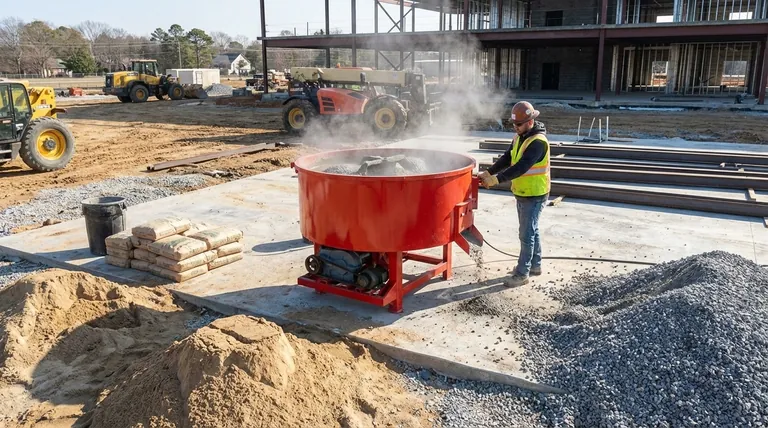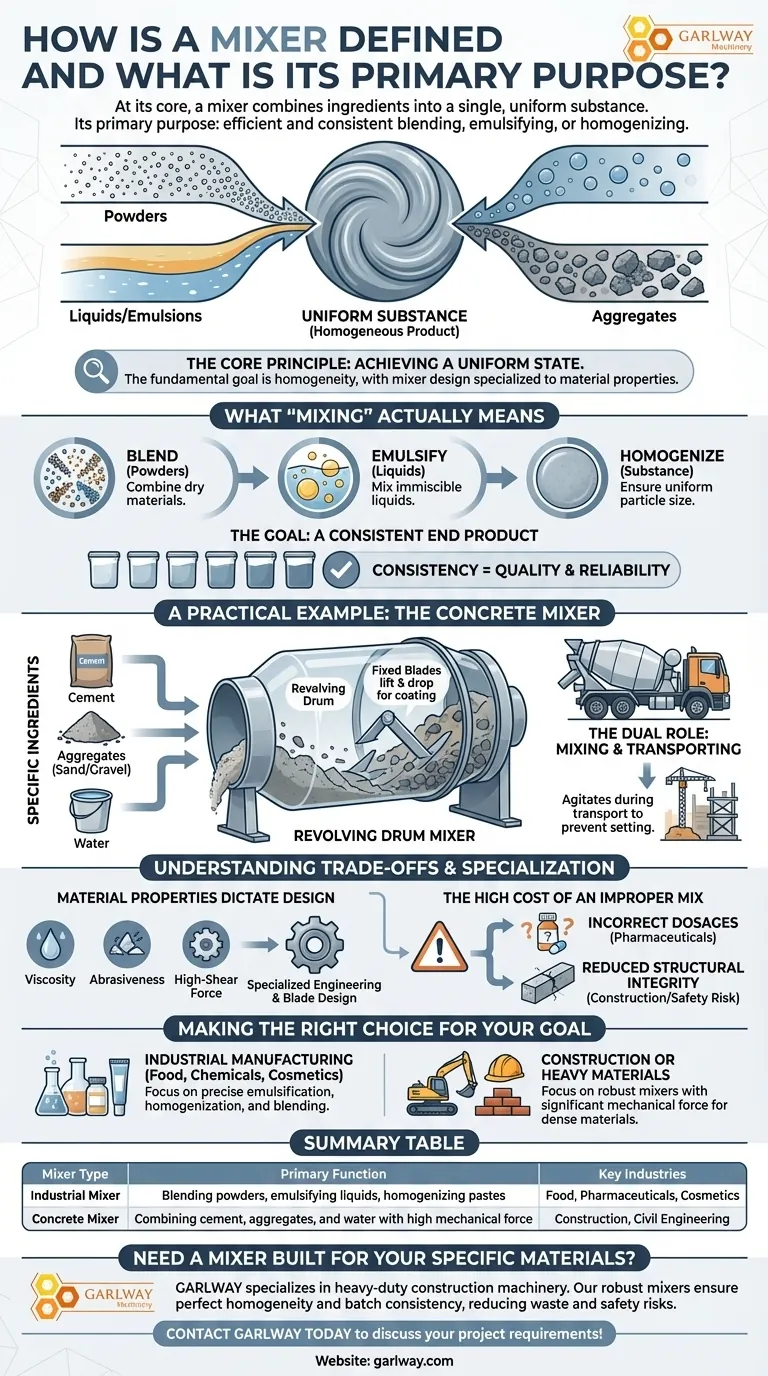At its core, a mixer is a machine designed to combine different ingredients into a single, uniform substance. Its primary purpose is to efficiently and consistently blend, emulsify, or homogenize materials, a critical step in manufacturing everything from pharmaceuticals and food to industrial concrete.
The fundamental goal of any mixer is to create homogeneity. While this principle is universal, the specific design of a mixer is always highly specialized to the unique properties of the materials it is intended to combine.

The Core Principle: Achieving a Uniform State
A mixer's job goes far beyond simple stirring. It applies specific mechanical forces to ensure that separate ingredients are thoroughly integrated into a stable, consistent final product.
What "Mixing" Actually Means
The term "mixing" can refer to several distinct processes. An industrial mixer might be designed to blend dry powders, emulsify liquids that don't normally combine (like oil and water), or homogenize a substance to ensure uniform particle size and distribution.
The Goal: A Consistent End Product
In any industrial or commercial application, consistency is paramount. A well-designed mixer guarantees that every batch of product—be it a cosmetic cream or a load of concrete—has the exact same properties as the last, eliminating variability and ensuring quality.
A Practical Example: The Concrete Mixer
The concrete mixer is a perfect illustration of a specialized machine built for a demanding task. It showcases how a mixer's design directly serves the needs of its specific ingredients.
The Specific Ingredients
A concrete mixer is engineered to combine a precise recipe: cement, aggregates (like sand or gravel), and water. These materials have vastly different densities and physical properties.
The Mechanism of Action
To handle this heavy, abrasive mixture, most concrete mixers use a revolving drum. Inside the drum, fixed blades continuously lift the materials and drop them back into the mix, using gravity and mechanical force to ensure every grain of sand and gravel is coated with the cement-water paste.
The Dual Role: Mixing and Transporting
Many concrete mixers are mounted on trucks, serving a dual purpose. These vehicles not only mix the concrete but also keep it agitated during transport, preventing it from setting before it reaches the construction site and is ready to be poured.
Understanding the Trade-offs and Why Specialization Matters
Using the wrong type of mixer for a given task leads to poor results, wasted materials, and potential product failure. The design must be matched to the job.
Material Properties Dictate Design
A mixer designed for blending thick cosmetic creams requires different forces and blade designs than one built to handle the abrasive, heavy components of concrete. Factors like viscosity, abrasiveness, and the need for high-shear force determine the machine's engineering.
The High Cost of an Improper Mix
An incomplete or inconsistent mix can have serious consequences. In pharmaceuticals, it could lead to incorrect dosages. In construction, poorly mixed concrete has reduced structural integrity, posing a significant safety risk. This is why the process must be "quick and economical," but above all, effective.
Making the Right Choice for Your Goal
Understanding the core purpose of a mixer helps you evaluate its application for any project.
- If your primary focus is industrial manufacturing (food, chemicals, cosmetics): You need a mixer designed for precise emulsification, homogenization, and blending of liquids, powders, or pastes.
- If your primary focus is construction or heavy materials: You need a robust mixer capable of applying significant mechanical force to homogeneously combine dense aggregates and binding agents.
Ultimately, selecting the right mixer is about matching the machine's mechanical action to the specific physical properties of your ingredients to achieve a perfectly uniform result.
Summary Table:
| Mixer Type | Primary Function | Key Industries |
|---|---|---|
| Industrial Mixer | Blending powders, emulsifying liquids, homogenizing pastes | Food, Pharmaceuticals, Cosmetics |
| Concrete Mixer | Combining cement, aggregates, and water with high mechanical force | Construction, Civil Engineering |
Need a Mixer Built for Your Specific Materials?
GARLWAY specializes in heavy-duty construction machinery, providing robust and efficient mixers designed for demanding applications. Whether you are a construction company needing reliable concrete mixers or a contractor requiring equipment for consistent material blending, our solutions ensure perfect homogeneity and batch consistency, reducing waste and safety risks.
Contact GARLWAY today to discuss your project requirements and find the ideal mixing solution!
Visual Guide

Related Products
- Commercial Construction Mixer Machine for Soil Cement Mixing Concrete
- Auto Concrete Cement Mixer Machine New
- Portable Ready Mix Concrete Mixer Equipment
- Construction Products Concrete Plant Machine Mixing Concrete Mixer
- JDC350 Small Cement Concrete Mortar Mixer
People Also Ask
- What maintenance should be performed after using the mixing blade? A 3-Step Guide to Maximize Lifespan
- What are the purposes of low-speed agitation in truck mixers? Preserve Concrete Quality During Transit
- What are the advantages of flat-mouth mixers in terms of mixing efficiency? Achieve Superior Concrete Quality
- How are concrete mixers classified based on installation methods? Stationary vs. Mobile Mixers Explained
- What are twin-shaft mixers and why are they efficient? Achieve Superior Concrete Quality & Speed
- What is the key functional difference between self-loading mobile concrete mixers and regular mixer trucks?
- What post-operation procedures should be followed for a self-loading concrete mixer? Ensure Longevity & Prevent Downtime
- What are rotor mixers and where are they commonly used? A Guide to High-Shear Mixing



















